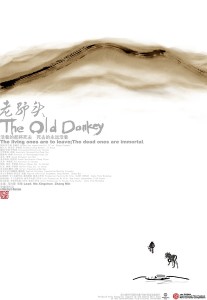The Old Donkey
老驴头
China, 2010, colour, 16:9, 112 mins.
Director: Li Ruijun 李睿珺.
Rating: 5/10.
Strikingly shot peasant drama is cramped by slow, arty direction.
A small village on the edge of the desert, Gansu province, China, winter. Under a new government directive on land reform, local bigwig Zhang Yongfu (Sun Chunyan) is buying up land owned by peasant farmers or trying to force them off their land, in order to build a chemical factory that will benefit the village. Eighty-four-year-old Ma, nicknamed Old Donkey (Ma Xingchun), is among those stubbornly refusing to sell land that was given them under a 1982 government reform. Apart from his daughter Ma Lianhua (Zhang Min), who looks after and works with him, the rest of Ma’s children have moved to a nearby town. The eldest son (Li Shengfu) drinks, the youngest (Wu Renlin) gambles, and the other (Fu Bingchou) hasn’t visited his father in four or five years. The grave of Ma’s parents on the edge of the desert is being swallowed up by sand, and with the help of an old friend, Ma Dazhi (Wang Dazhi) – who was cheated by Zhang into selling his land – he plants wheat-straw terracing on the side of a nearby sand dune to protect the graves. Meanwhile, Zhang keeps up the pressure on Ma and others to sell their land, and Ma’s health continues to decline as he tends the terracing.
REVIEW
Reminiscent of Yellow Earth 黄土地 (1984) in its portrayal of peasant stubbornness and its striking use of figures against landscape – here sandy Gansu province rather than the ochry hills and ravines of Shaanxi – this second HD-shot feature by independent writer-director Li Ruijun 李睿珺 (The Summer Solstice 夏至, 2007) is most notable for the camerawork by Yang Jin 杨瑾, which often places humans in medium shot against stunning background deserts, emphasising the characters’ determination but also their helplessness to prevent the inevitable. Li’s fixed set-ups and leisurely editing allow plenty of time to admire the compositions but also work against any emotional involvement with the characters, in a familiar tale of the forces of commerce vs. tradition. Li’s consciously arthouse style, which also avoids any use of music, has none of Yellow Earth‘s folkloric flavour, and until the closing minutes deliberately distances the viewer from what could have been a much more involving drama.
The cast of The Old Donkey – shot around Li’s home town of Gaotai, Gansu province – is made up of friends and relatives, most of whom give OK performances within a very narrow emotional bandwidth. Dialogue, in thick local dialect, is relatively sparse, befitting the taciturn peasant types, though the playing of Ma Xingchun 马兴春 as the title character and especially Zhang Min 张敏 as his loyal daughter does grow in the later stages. As the only cast member who gives a “normal” performance, Cao Hongmei 曹红梅 stands out in a brief role as the daughter’s kindly former schoolfriend. Though this kind of story and setting now has an old-fashioned look, the movie still has much more dramatic potential (especially in the family tensions and ambivalent portrayal of Ma and his daughter) than Li ever allows it.
CREDITS
Presented by Li Ruijun Film Studio (CN), IndieFilm Studio (CN). Produced by Li Ruijun Film Studio (CN), IndieFilm Studio (CN).
Script: Li Ruijun, Peng Tao. Photography: Yang Jin. Editing: Zhang Jun, Li Ruijun. Art direction: Li Ruijun. Sound: Lou Kun.
Cast: Ma Xingchun (Ma/Old Donkey), Zhang Min (Ma Lianhua, his younger daughter), Wang Dazhi (Ma Dazhi), Sun Chunyan (Zhang Yongfu), Ma Chongyue, Tang Jide, Chao Yancheng (old men), Li Shengfu (Ma’s eldest son), Wang Xiaolan (eldest son’s wife), Fu Bingchou (Ma’s second son), Li Haiyan (second son’s wife), Wu Renlin (Ma’s youngest son), Wang Cailan (youngest son’s wife), Wang Cuilan (Ma’s elder daughter), Wu Yunzhi (Xiaoyun, Ma Lianhua’s son), Zhang Changrong (Zhang, secretary), Wang Zhiliang (Ma, doctor), Cao Hongmei (Lanlan, Ma Lianhua’s schoolfriend), Che Hairong (hospital nurse), Li Yuelan (Ma Dazhi’s wife), Wang Hong, Gong Siyin, Li Shenghong, Tang Jianguo, Li Shicheng, Li Changrui (tractor drivers), Tian Zhanding (county party secretary), Yang Guangrui (eldest son’s driver).
Premiere: Pusan Film Festival (New Currents), 9 Oct 2010.
Release: tba.
(Review originally published on Film Business Asia, 13 Oct 2010.)
